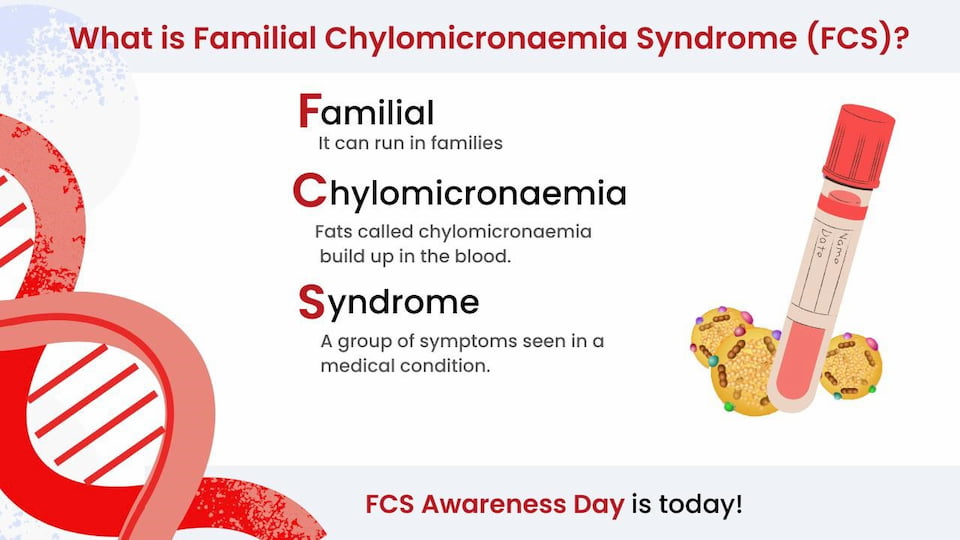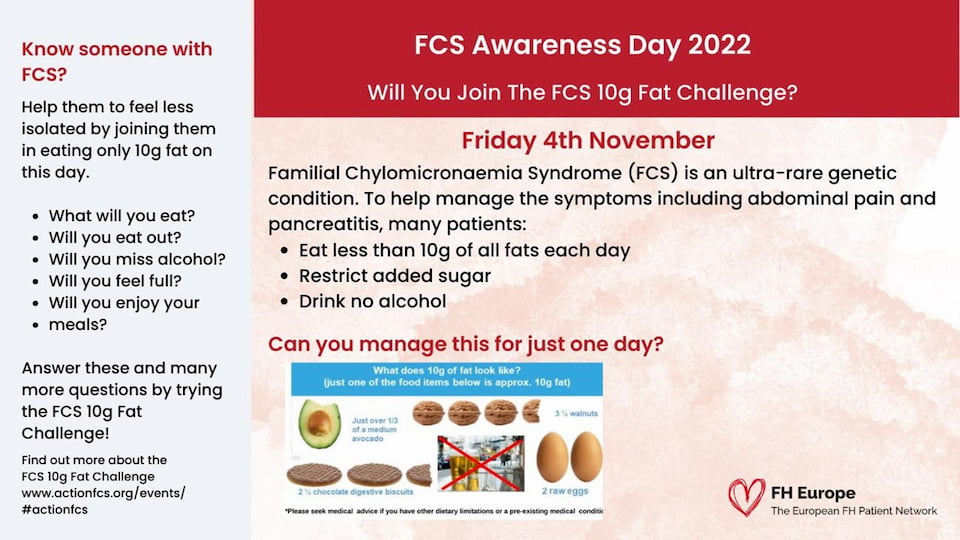Familial Chylomicronaemia Syndrome (FCS) Awareness Day
Today is Familial Chylomicronaemia Syndrome (FCS) Awareness Day.
This year the FCS community celebrates FCS Awareness Day on November 4, 2022.
But living with familial chylomicronemia syndrome isn’t a one day event – it’s a condition that people struggle with their entire life. Much like living with the condition on a daily basis, we believe FCS awareness should be more than a ‘one and done’ event. So this year, we are celebrating the fifth annual FCS Awareness Day on a bigger scale.

What is FCS?
Familial Chylomicronaemia Syndrome (FCS) is a rare genetic disorder. It is called “familial chylomicron – aemia” because it is inherited through families and the condition results in high levels of chylomicrons in the blood.
There are at least six genes known to be associated with FCS, and most mutations occur in the LPL gene. This gene makes a protein called lipoprotein lipase, which helps break down fat in the blood. In people with FCS, a type of fat called triglyceride builds up in the body at very high levels, leading to health problems like pancreatitis.
Under normal conditions, an enzyme called lipoprotein lipase (LPL) breaks down the chylomicrons as they travel through the blood. This releases the triglycerides for uptake into the muscle and fat tissues around the body.
Familial chylomicronaemia syndrome (FCS) occurs when these chylomicrons cannot be broken down normally. This occurs when LPL doesn’t work correctly, either because it is defective or absent, or because another component it requires does not work. The result is an elevated level of chylomicrons and triglycerides in the blood, i.e., chylomicronaemia. This is what leads to most of the symptoms of the condition. The degree of elevation of chylomicrons and triglycerides corresponds with the severity of the symptoms. Like FH, FCS is a lipid condition.
Did you know that nearly one hundred gene alterations have been identified that cause FCS? About 1 in 500 people are thought to carry one of these FCS causing gene alterations.
Even a little fat can make someone with FCS ill
For people with FCS is recommended a very low fat diet. The amount of fat that someone can eat daily varies from person to person, but the general recommendation is that people should eat less than 20g of fat per day (some have a daily limit much lower than this). Fat intake should be spaced throughout the day.
People with FCS are recommended to limit their intake of added sugars and advised to eat complex carbohydrates such as pulses and wholegrain whilst monitoring fat intake. Complex carbohydrates take longer to digest leading to a slower rise in blood sugar levels. Whereas refined carbohydrate, such as processed cereals, white bread and white rice, can have a more rapid increase in blood sugar levels.
Doctors recommend that alcohol and smoking should be also avoided by people with FCS.
Why is a diagnosis so important?
Finding out that FCS is the right diagnosis is important because it may help healthcare professionals make lifestyle recommendations and referrals to specialists, such as a lipidologist.
FCS like FH FH, HoFH and elevated Lp(a) is a cholesterol-related condition that can cause heart disease and recurrent heart attacks. That is why we think awareness is such important, to prevent the consequences and to help others better understand the burden of living with FCS.

FH Europe is supported by an educational grant from Amgen Limited, Sanofi, Regeneron, Akcea Therapeutics Inc. and Amryt
Site by: Vovi Web Design

